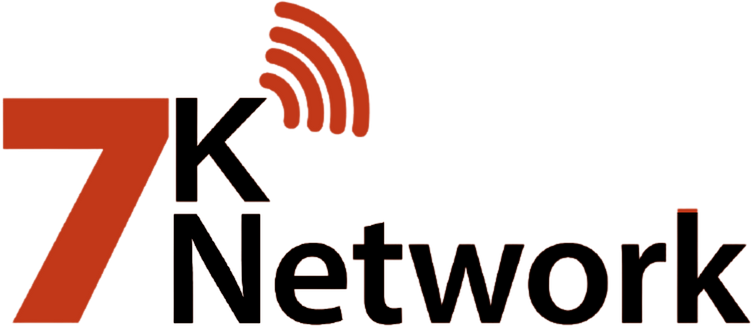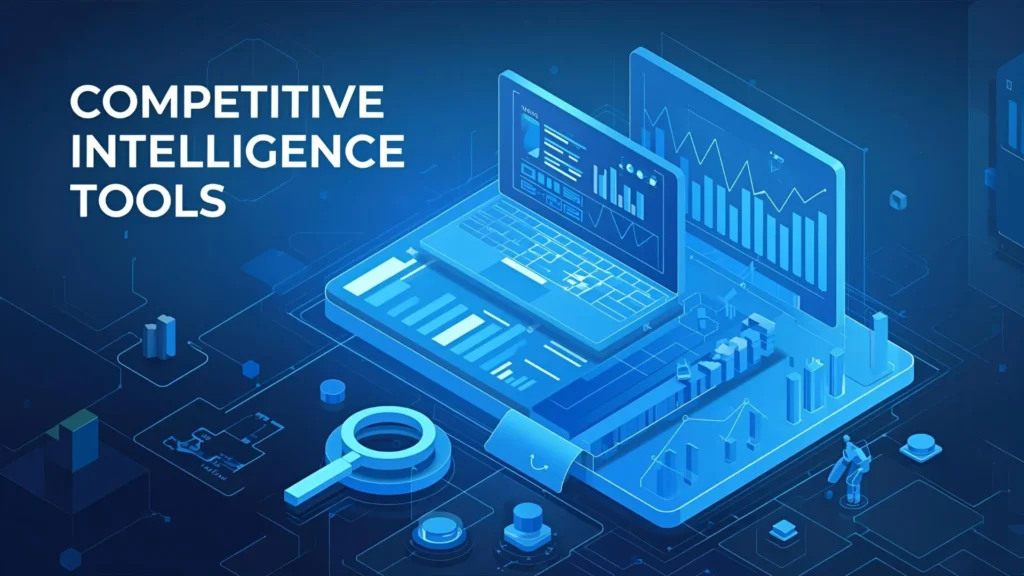In a dynamic business environment today, you need more than intuition and guesswork to remain ahead of competitors in the pack. Successful businesses today depend on advanced competitive intelligence systems to collect, process and respond to important market data. These are potent sites that can convert raw data to actionable intelligence that can then be utilized by businesses to make informed business decisions that result in growth and competitive edge in the market. Competitive intelligence tools are now irreplaceable resources of organizations aiming to achieve sustainable success in competitive markets of all industries including the price education of their competitors or monitoring social media reactions.
What is Competitive Intelligence?
Competitive intelligence is the professional gathering, examination and meaning of data about rivals, market pattern, and market activity to improve decision-making. This is achieved by finding the already public data in multiple mediums such as competitor websites, social media sites, industry publications and customer reviews. Much of this information collection and analysis is automated by competitive intelligence tools and converts uncoordinated pieces of information to a finished informational package. Competitive intelligence is on a legal and ethical level unlike industrial espionage especially because it uses information available publicly to comprehend positioning of the market, their strategies and potential future in business development.
Why Competitive Intelligence Matters in 2025
With the digital transformation the competition dynamics have become at a higher pace and real time market awareness is essential in business survival and development in the current global connected market position.
- Agility: faster decision-making by automated systems of data collection, dataAnalysis to allow quick strategic changes.
- Innovation: The recognition of market gaps and trends before the competitors exploit the unutilized opportunities and consumer demands.
- Risk: Preemptive detection of threats and preemptive mitigation measures to ensure that market share is not lost to rival actions and shocks.
- Efficiency: Optimization of resources due to the realization of the weaknesses of competitors and provision against the expensive strategic mistakes with the help of intelligent planning.
- Growth: Strategic growth prospects unearthed by integrative marketing intelligence and competitive performance in more than one channel.
Competitive Intelligence Techniques
SWOT Analysis
SWOT analysis has been a staple technique in the competitive intelligence platforms, whereby it offers methodical analysis of Strengths, Weaknesses, Opportunities, and Threats in the competitive space. This model facilitates organizations to place themselves in a strategic position through the identification of organizational capability vis-a-vis the market environment.
Market Trend Monitoring
Competitive intelligence tools are used to monitor market trends which entail systematic tracking of the activity in the industry, the changes in consumer behavior and the changes made by technology which affects competitive positioning. These advanced platforms take numerous data sources such as industry publications, social media discussions, patent applications, and regulatory reforms to define new trends. Sophisticated analytics algorithms are used to analyse huge amounts of data and distinguish between short-term factors and the long-term market trends.
Competitor Benchmarking
Independent Competitor benchmarking employs competition intelligence tools to avail of a systematic value of performance measures, strategy, and capacity on the competitive fronts. These media gather information using rival prices, product functionalities, advertising campaigns, clientele fulfillment rating, and market portions in order to determine overall performance benchmarks.
Social Listening
Competitor Intelligence can be used as a way of social listening in which an individual checks the social media, online forums and online communities to obtain information about their competitors, customer views and what the market thinks of them. The advanced platforms process millions of social media posts, comments, and other discussions to determine their trend, sentiment patterns, and new issues impacting their competitors. Higher-level natural language processing programs use the topics, sentiment, and level of influence to classify conversations.
Website Traffic & Keyword Tracking
Online visitor counts and monitoring keyword-based applications through competitive intelligence gathers a comprehensive view about competitor online marketing approaches, content implementation, and search capability. Using these platforms, competitor websites’ traffic data is evaluated, frequently visited defining content pages, region of referrals, and search positions to comprehend the computer digitization market share.
10 Best Competitive Intelligence Tools in 2025 (Top Picks)
1. SimilarWeb
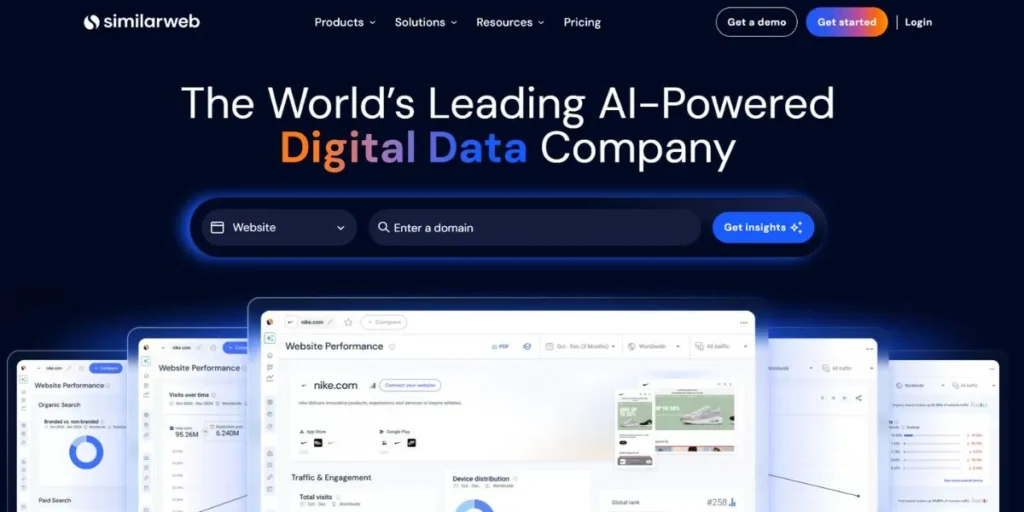
SimilarWeb is among the best competitive intelligence tools that provide detailed digital market intelligence and website analytics solutions. This is a powerful platform to provide particular dynamics regarding the online traffic of the competitors, their surfing habits, their promotional activities and the movement of the people. Users can examine their traffic origins, the most frequent visits page, during or after employment web pages and search ranking to discover rival online strategies.
The instrument gathers information that has been drawn in via a series of sources like panel data, crawled websites and partnerships with internet service providers in a way that it delivers accurate approximations of the traffic. Other features and applications are mobile application analytics, industry and benchmarking comparison, conversion and competitive search of keywords.
Key Features:
- Traffic Analytics
- Audience Intelligence
- Keyword Research
- Mobile Analytics
- Market Share
Pros:
- Comprehensive Data
- User-Friendly Interface
- Global Coverage
Cons:
- Expensive Pricing
- Limited Accuracy
- Complex Setup
Best For: Digital Marketing
Pricing: $1,500 / year or $199 / month
Website: https://www.similarweb.com
2. Crayon
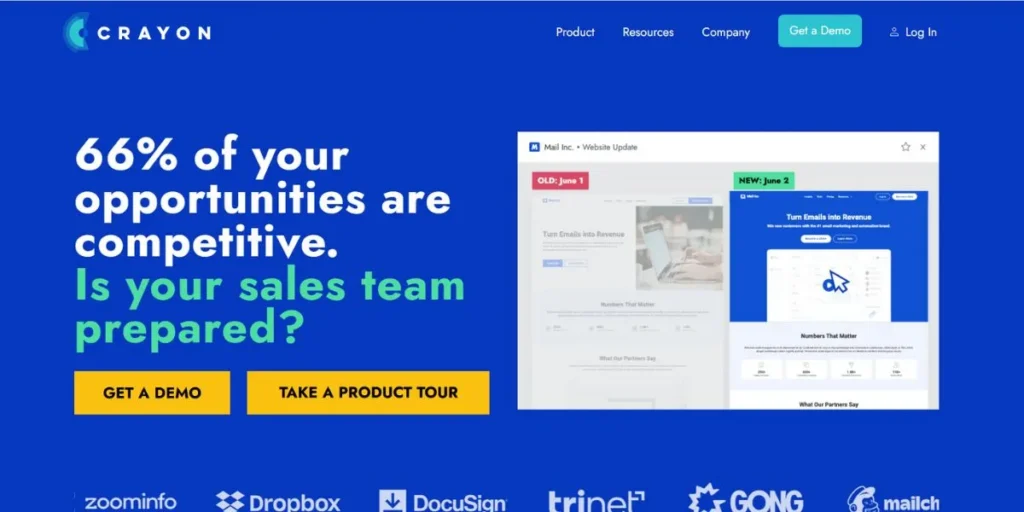
One of the brightest competitive intelligence technologies that are active in the sphere of real-time competitor monitoring, competitive market intelligence automation, is the Crayon. These digital touchpoints will stay in the wake of websites of competitors, content marketing, product development and price changes in these platforms. The artificial intelligence engine will watch vital competitor actions and send live alerts to the interested stakeholders involved.
The user benefits are; data collection processes are automatically carried out, content and user customization of monitoring parameters are automatically grouped. The platform is connected to the existing business systems and makes the insights practicable by presenting in user-live dashboards. The latest analytics can advise their organizations of the trends set by their selected competitors, predict the trend by the market and respond early enough to competition threats against their competitors.
Key Features:
- Real-Time Monitoring
- AI-Powered Insights
- Automated Alerts
- Custom Tracking
- Integration Capabilities
Pros:
- Instant Updates
- Smart Filtering
- Easy Setup
Cons:
- Premium Pricing
- Learning Curve
- Limited Customization
Best For: Enterprise Monitoring
Pricing: Custom pricing
Website: https://www.crayon.co
3. SEMrush
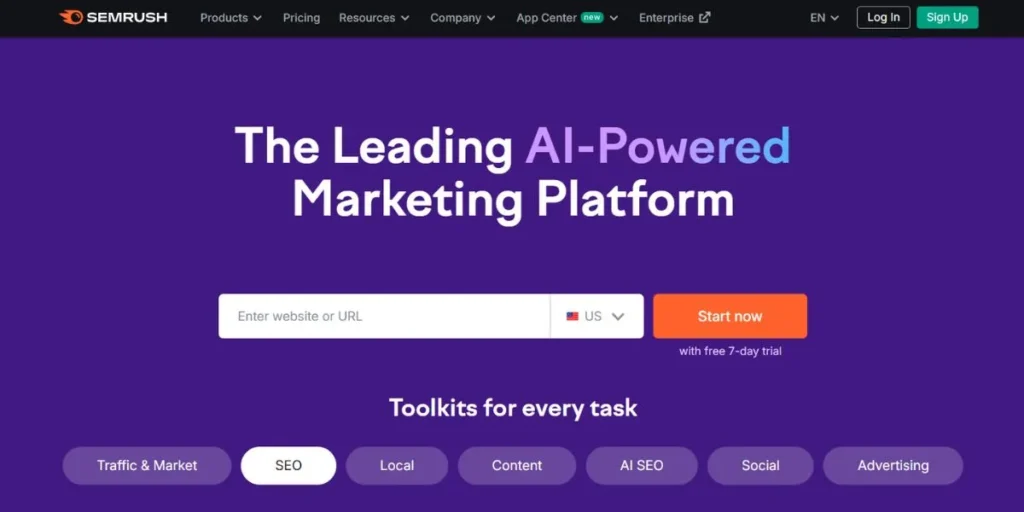
SEMrush is the most appropriate tool that is diverse in the competitive intelligence business in search engine optimization, nationalizing Pay-per-Click advertisement, and total traffic analysis. It is a comprehensive escape box that enables the process of analyzing competitor keywords, backlink profiles, the advertisements method and content optimization of every search engine.
The tool provides comprehensive detailed information on paid accepting advertisements and competitor campaigns such as provision of copy of advertisements, key word provision and provision of landing pages. trickle includes position monitoring, site auditing, social media monitoring and content gap analysis. The users get an opportunity to find out which keywords can be profitable, optimize their online marketing campaigns, monitor the outcomes of their competitors in search engines with transparent dashboards and automatic reporting systems.
Key Features:
- Keyword Research
- Backlink Analysis
- PPC Intelligence
- Content Auditing
- Rank Tracking
Pros:
- Comprehensive Features
- Accurate Data
- Regular Updates
Cons:
- Steep Learning
- High Cost
- Complex Interface
Best For: SEO Marketing
Pricing: $117.33/mo
Website: https://www.semrush.com
4. ZoomInfo
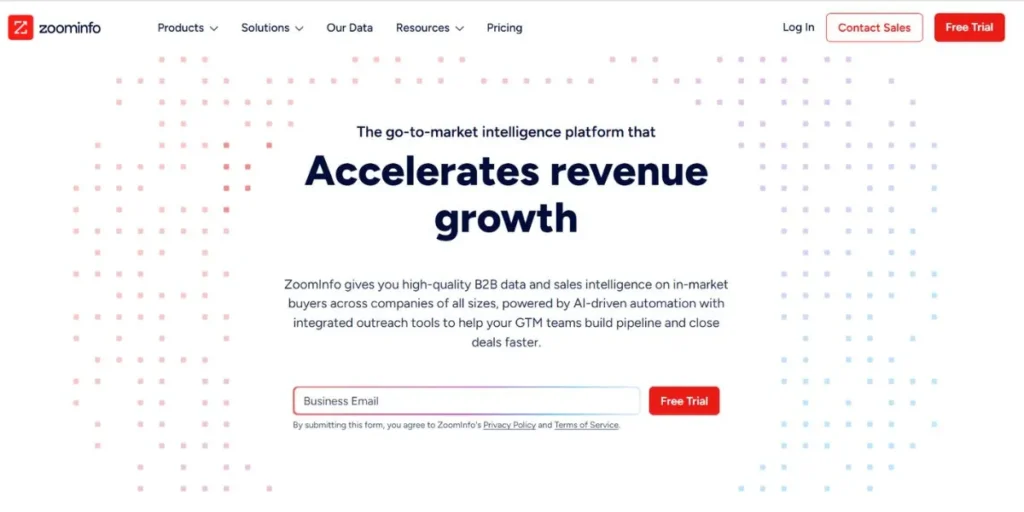
One of the competitive intelligence platforms that handle sales intelligence and business database management to B2B companies is the ZoomInfo company. This is used to serve ready and complete company contact data, profile, company chart and contacts of decision makers in millions of businesses worldwide offloaded out of the site.
The provided improved search option enables a user to discover where to get customers, trace competitor relationships and discover market penetration plans. The system becomes linked to the customer relation management system, marketing automation system and sales enablement platform. The information is up-to-date,—live, and the advanced analytics help organizations to identify the market potential and risk in the target markets.
Key Features:
- Contact Database
- Company Profiles
- Sales Intelligence
- CRM Integration
- Market Analysis
Pros:
- Extensive Database
- Accurate Information
- Integration Options
Cons:
- Expensive Plans
- Data Limitations
- Complex Navigation
Best For: B2B Sales
Pricing: Custom pricing
Website: https://www.zoominfo.com
5. Klue
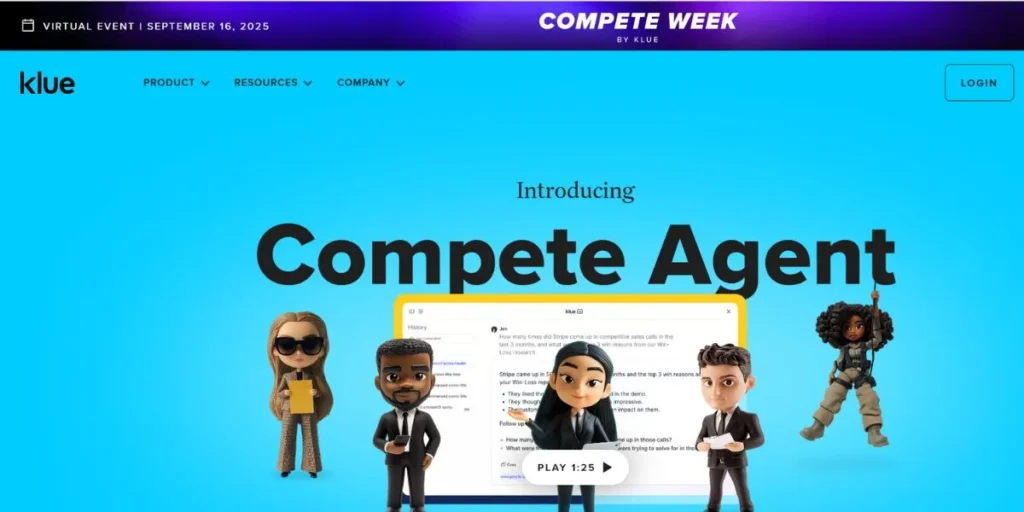
This is one of the most committed competitive intelligence tools that Klue concentrates in that it is company sales team tailored competitive enablement programs. Through this platform interactive battlecards, competitor profiles and sales intelligence tools are generated that help sales representatives unlock more wins. The tool collects competitive intelligence of a number of sources and translates raw data into sales data that can be acted on.
Enthronish advanced functionalities such as win-loss analysis, guides on competitive positioning and automated updating of data is offered. It has been linked to customer wide relationship management system and real time alert is made to the platform regarding the competitive mode when subsequent sales are underway. It is also possible to customize dashboards and avail useful competitive intelligence aShort time to the sales teams whenever interacting with the customer.
Key Features:
- Sales Battlecards
- Win-Loss Analysis
- Competitive Alerts
- CRM Integration
- Team Collaboration
Pros:
- Sales-Focused Design
- Easy Implementation
- Actionable Insights
Cons:
- Narrow Focus
- Limited Features
- Premium Pricing
Best For: Sales Teams
Pricing: Custom pricing
Website: https://klue.com
6. BuzzSumo
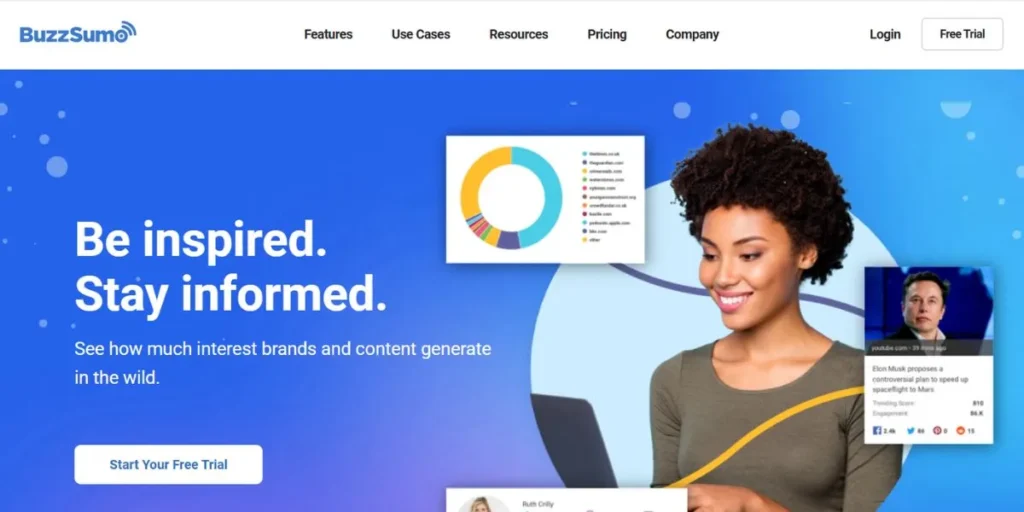
BuzzSumo is one of the best competitive intelligence tools that focus on the content marketing analytics and the social media performance tracking. It is a powerful instrument that analyzes performance of the content on the social media platforms, topics that are popular and influencer trends to employ. The users will be equipped to determine the most shared content in specific industries, to compare the competitor content strategies, and to identify the key individuals who are leaders in the conversation.
More features include social media monitoring and competitor content examination and the content alert functionality. The platform will enable a closer analysis of the content engagement data, the optimal moments to post as well as what the audience likes. Automated reports help companies not only simplify their content marketing strategies but also remain on top of the trending content.
Key Features:
- Content Analytics
- Influencer Discovery
- Social Monitoring
- Trend Analysis
- Competitive Content
Pros:
- Content-Focused Features
- Influencer Database
- Easy Interface
Cons:
- Limited Scope
- Pricing Tiers
- Basic Analytics
Best For: Content Marketing
Pricing: $199 /month
Website: buzzsumo.com
7. Brandwatch
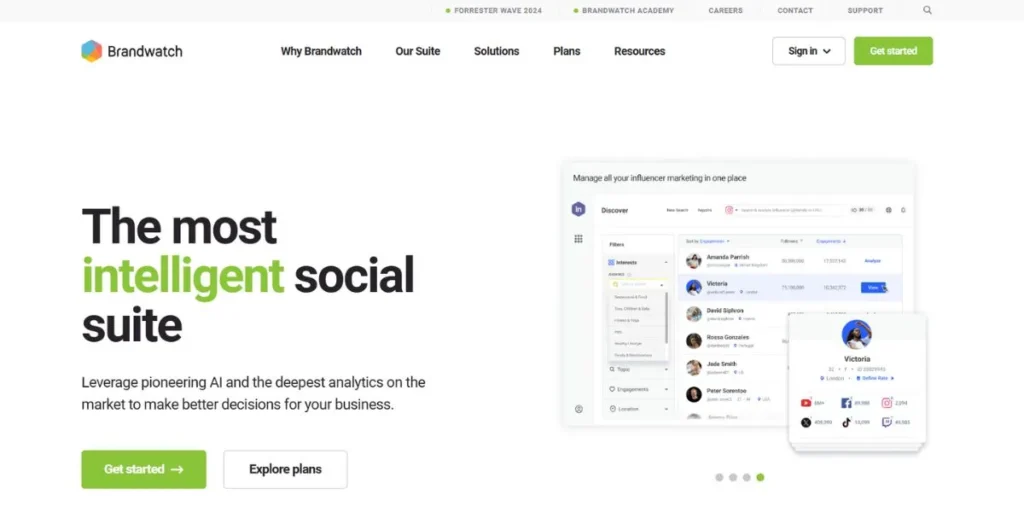
Competitive intelligence software Brandwatch is one of the most applicable software and can perform advanced sentiment analysis and social media monitoring has the trick. It is a platform on which enterprises monitor billions of online conversations on social platforms, blogs, forums and news sites to deliver comprehensive brand knowledge. The use of feelings, emotions, and social context in social media discussion is perceived in the high-grade natural language processing code.
Users can track competition citation, identify crisis and brand perceptions in real time. The platform provides detailed demographic data as well as how they identified influencers and variance data. Organizations can know the impact of the presence of social media and competitors with dashboards, which can be designed and automated reporting systems.
Key Features:
- Social Monitoring
- Sentiment Analysis
- Influencer Tracking
- Crisis Detection
- Audience Insights
Pros:
- Advanced Analytics
- Comprehensive Coverage
- Real-Time Monitoring
Cons:
- Complex Setup
- High Pricing
- Steep Curve
Best For: Brand Monitoring
Pricing: Custom pricing
Website: https://www.brandwatch.com
8. Owler
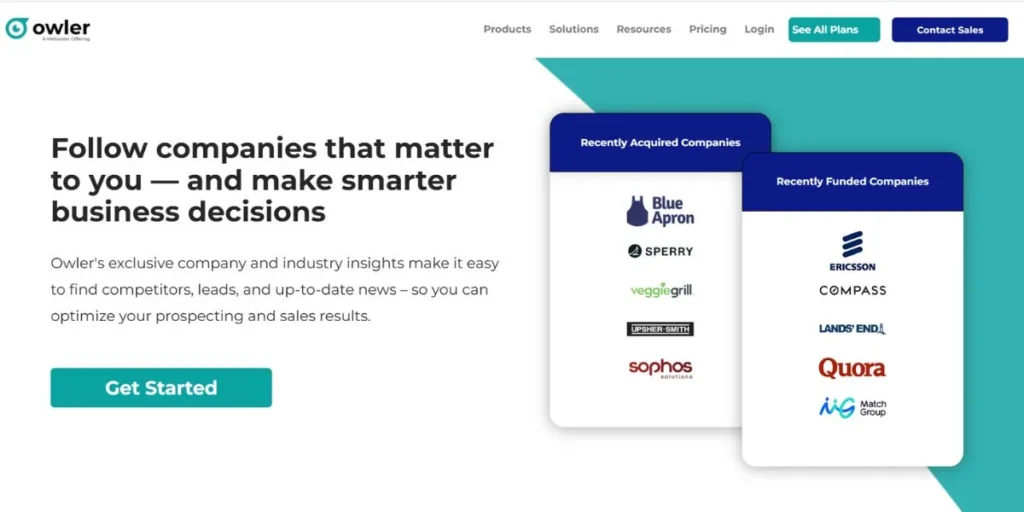
One of the most accessible competitive intelligence products is Owler which builds on automated news attention and competitor intelligence alerts aligned with any company no matter the size. This support-cutting site has aggregated news articles, press reports and state of business which involve competitors and industrial change of direction. On the community-based method the user is permitted to donate his/her own information and have right to the crowd-sourced competitive intelligence.
Tracking of funds, monitoring of acquisitions and the executive movement are some of its advanced functions. The application sends the personalized news digest to the inbox of news users by providing them with the news alerts and competitive training. Integration capabilities can be guaranteed within the sales team to make sure that they are aware of competitors and market trends and the ability to merge with the customer relationship management systems.
Key Features:
- News Monitoring
- Company Profiles
- Funding Tracking
- Executive Alerts
- Community Insights
Pros:
- User-Friendly Design
- Free Options
- News Aggregation
Cons:
- Limited Analytics
- Basic Features
- Data Accuracy
Best For: Small Businesses
Pricing: $39 Per Month
Website: https://corp.owler.com
9. Kompyte
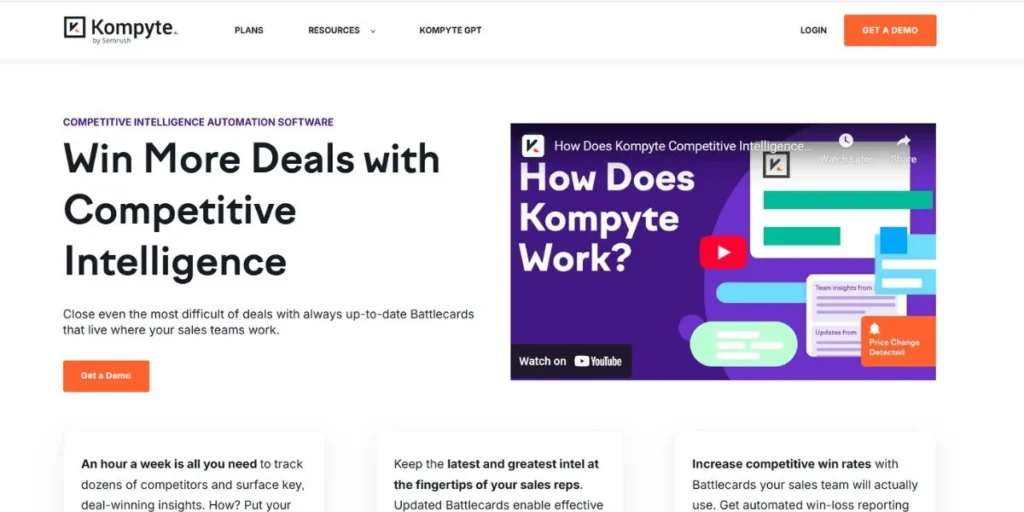
One of the specialized competitive intelligence tools that specialize in pricing intelligence is Kompyte, and they also track the competitive movement through digital channels. It is a feature of automation whereby the competitor prices, product information, promotion actions, and amendments to the market campaign will be monitored in real-time. The highly advanced surveillance systems cover websites, mobile applications, social nets and on-line advertisers.
The artificial intelligence engine is capable of recognizing the major competitive trends and provides real-time notification to the stakeholders of the study. Customers can edit scenario monitoring, track a specific competitor or price trends with time. Integration with systems of business intelligence helps the countries to take action when challenged by a rivalry and possibilities in business.
Key Features:
- Pricing Monitoring
- Automated Tracking
- Real-Time Alerts
- Custom Scenarios
- Competitive Analysis
Pros:
- Specialized Focus
- Automated Monitoring
- Quick Alerts
Cons:
- Narrow Scope
- Premium Features
- Limited Integration
Best For: Price Monitoring
Pricing: Custom pricing
Website: https://www.kompyte.com
10. Google Alerts
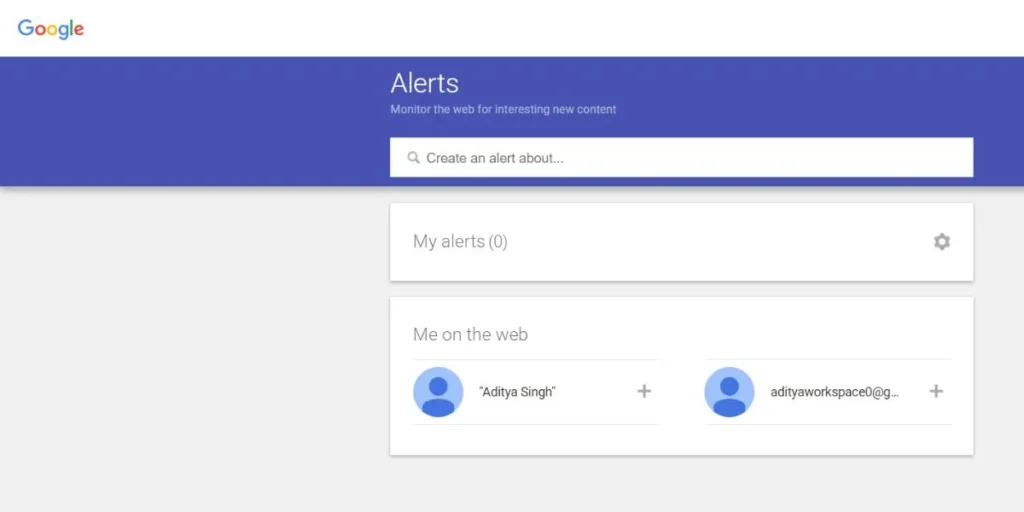
Google Alerts is one of the readily available types of competitive intelligence that are free and provide easy monitoring to firms with limited budget. It is a simple and effective utility that will email when a new article that includes the identified keywords appears in the course of the Google search. Users can monitor newspaper mentions of competitors, industry, release of new products and brand mentioning throughout the web.
The tool includes the web pages, news contents, blogs and scholarly content in Google search engine index. Its customization implementation is alert frequency, and type and language of choice. Google Alerts is a productive competitor intelligence tool where small firms or individuals start out surveillance to market with an initial small market surveillance which is simple compared to the more sophisticated tools.
Key Features:
- Keyword Monitoring
- Email Alerts
- Source Filtering
- Language Options
- Free Access
Pros:
- Completely Free
- Easy Setup
- Google Integration
Cons:
- Basic Functionality
- Limited Sources
- No Analytics
Pricing: free
Best For: Beginners
Website: https://www.google.co.in/alerts
How to Do Competitive Intelligence (Step-by-Step)
Effective competitive intelligence is best applied to gain the highest possible benefits through the systematic planning, strategic selection of tools and regular execution to achieve the highest levels of competitor understood insight and business influence on all government levels.
- Planning: Before deciding on what tools and methodologies to use, identify targeted competitors, specific intelligence goals, key metrics and targets of success.
- Collection: Accrue various data assets through automated instruments of data collection, personal research and industry networks to represent universal intelligence facilities.
- Analysis: Process takes information and patterns gathered and converts it through competitive intelligence tools and knowledge into actionable behaviors or action plans.
- Distribution: circulate share intelligence data to the appropriate stakeholders via tailored reports, dashboards, and specific audience-specific presentations.
- Action: Take strategic actions according to intelligence information and continuously assess the outcomes so as to improve the intelligence collecting approach in the future.
Competitive Intelligence Best Practices
A best practices compliance ensures that competitive intelligence programs are as valuable as they can be and, at the same time, can be ethical and align the activities of any business enterprise and planned actions.
- Ethics: Be politically correct and ethical, try to focus on social information and remain within the law, other methods than industrial espionage.
- Quality: Emphasis should not be on data quantity but the accuracy and reliability of the information sources in such a way that the intelligence can be used in business decision-making.
- Integration: Member competition intelligence operations must be aligned to business strategy and business objectives so as to draw value and to utilize resources appropriately.
- Teamwork: Facilitate cross-functional collaboration between marketing and sales activities, strategy and operations groups in order to leverage a diverse point of view and competency foundation.
- Continuous: develop the internal capabilities of round-the-clock surveillance and periodic intelligence briefs in comparison to the single research aiming at creating competitive advantages that will provide long-term advantages.
Common Mistakes to Avoid
Knowledge of the pitfalls of competitive intelligence enable organizations to create more successful strategies and prevent it with expensive errors that can demoralize intelligence projects and business results.
- Overwhelming: and then avoid throwing Information at people by concentrating on specific measures and practical ideas instead of covering people with volumes of irrelevant information.
- Exceeding expectations: To have up-to-date intelligence Set-up regular update cycles and monitoring mechanisms of changing market conditions to ensure the intelligence is up-to-date and relevant.
- Assumptions: Formulate conclusions on the proven information and sources as opposed to turning to strategic choices on the basis of unproven or half-verified information.
- Isolation: Combine competitive intelligence and the rest of business operations instead of viewing it as a single stand-alone activity that is not related to strategic planning.
- Reactive: Build intelligence gathering mechanisms that are based in the future or offset the occurrence of a competitive crisis or imminent danger to the market place.
Conclusion
The competitive market environment of 2025 requires a highly intelligent collection of information that is not restricted to conventional methods of market research. Competitive intelligence solutions have become competitive business assets that enable real-time discussion, automation, and predictive analytics that can underpin business-oriented strategic planning.
Organizations that invest in the right combination of best competitive intelligence tools position themselves to anticipate market changes, identify opportunities, and respond effectively to competitive threats. To be successful means to make the right choice of tools and methods, to use systematic processes and at the same time adhere to ethical behavior and establish organizational orientation. The future of business lies with those companies that are able to plan competitive intelligence strategies that turn data to actionable intelligence.
FAQs
What are competitive intelligence tools?
Competitive intelligence software refers to software-based systems that passively retrieve, analyse, and present data on competitors, market trends, and industry trends to enable strategic business decision-making within business jurisdiction systems.
What tool allows you to search external competitive intelligence research?
Multiple competitive intelligence software tools enable external research, including SimilarWeb for web analytics, SEMrush for SEO intelligence, and BuzzSumo for content performance analysis across various digital channels.
Are there free competitive intelligence tools available?
Yes, several free competitive intelligence tools exist, including Google Alerts for keyword monitoring, social media platform analytics, and basic website analysis tools that provide entry-level competitive insights.
